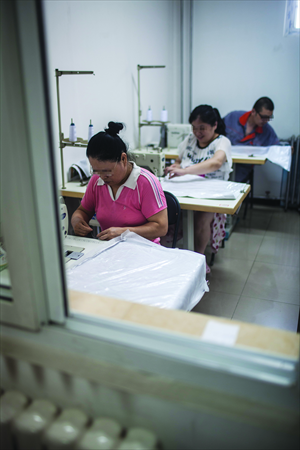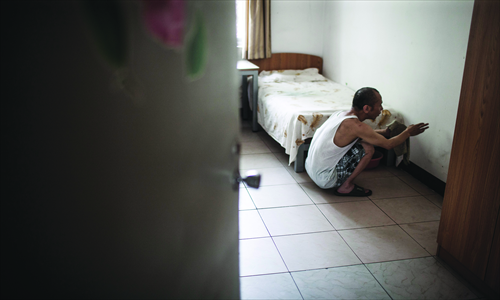Road to recovery

Li Xiao (pseudonym) in her dorm. Photo: Li Hao/GT

A mental health patient at Lily Garden. Photo: Li Hao/GT


A mental health patient rests in his room at Lily Garden, a rehabilitation center. Photo: Li Hao/GT
Li Xiao (pseudonym), 23, sits anxiously on her bed. Her only company in her dorm is a wide-eyed Pleasant Goat plush toy on her pillow. She anxiously thumbs the screen of her cellphone, rereading texts from former classmates who have promised to visit.
Li has had little contact with friends since she was diagnosed with schizophrenia four years ago. Since then, she has made great strides in her recovery through her work as a cashier at a convenience store, which employs six patients at Haidian Mental Health Treatment Hospital.
The convenience store and a drive-thru car wash next to it look like any other in Beijing, although both are staffed by residents of Jasmine Garden, a rehabilitation center for mental health patients.
The aim of Jasmine Garden is to reintegrate Li and others like her into society. However, the harsh reality is that it also serves as a home for people disowned by their families because of their mental illnesses.
Gong Jianmin, vice director of the hospital's rehabilitation department, said almost 150 patients approved for discharge were refused by their families in May despite hospital staff attempting to convince families face-to-face of their relatives' well-being.
The hospital runs 10 such rehabilitation centers in Haidian district, with names like Peony Garden, Begonia Garden and Narcissus Garden. They are home to more than 50 recovering mental health patients, who work a variety of menial jobs as part of their treatment.
Home away from home
Jasmine Garden's convenience store reveals no hint of its affiliation with the hospital; there are no nurses in scrubs or patients in gowns.
With loose pigtails falling to her shoulders, Li emerges from behind the counter to give a tour of the store's staff dorms and kitchen.
Li spiraled into schizophrenia in 2009 while at junior college after a teacher criticized her for her poor performance during practice for a school parade commemorating the 60th anniversary of the founding of the People's Republic of China.
She fell into a dark world of illusions and self-harm with scissors. Since joining the hospital's recovery program in 2011, Li has spent time at Peony, Begonia, Tiancun and Jasmine Gardens.
"I love Jasmine Garden because we all get along well with each other. After dinner, we usually go out and buy a watermelon to share," she says. "But I miss my job at Peony Garden.
I used to pack disposable chopsticks and was really efficient."
As a cashier, Li earns about 200 yuan ($33) per month and receives meals and board.
It is difficult to find any clue of Li's dark past from her upbeat, talkative persona. But does she yearn to return to college or even her family?
"No," she sternly replies.
"My father visits me every month and does not talk about me returning home, but I prefer life here anyway. There aren't many people who can chat with me at home."
Coping with family rejection
By contrast, Wang Liang (pseudonym) and Zhao Gang (pseudonym) are eager for a reunion with families unwilling to take them back.
Wang, 50, and Zhao, 52, both work at Jasmine Garden's car wash.
Sometimes they swap their bucket and sponge for farming equipment to tend to crops as part of what the hospital calls "farming therapy."
Wang, whose depression was triggered by years of alcohol abuse, has not seen his daughter for eight years. Without any photos, he fears he might one day forget what she looks like.
"My wife and sister come to see me every month, but my wife never speaks to me and doesn't want to take me home," he says. "I think she is selfish because she rents out our 47-square-meter home for about 4,000 yuan per month."
Bai Jing, head nurse at Jasmine Garden, confirmed Wang's account. After the family lost its breadwinner, Wang's wife moved in with her mother and leased out the home to pay for their daughter's college tuition, she says.
Zhao, a bachelor, was diagnosed with schizophrenia when he was 33. He has been hospitalized on and off for about 20 years. He has also been shunned by family; his two elder brothers are both married with children, while his elderly parents have neither the space nor ability to care for him.
"My parents don't want me to return home. My eldest brother now lives in my old bedroom and cares for our parents," he says.
Wang and Zhao's stories reflect common reasons that families refuse to welcome home patients approved for discharge, says Gong.
Concerns about violent behavior
Although many who live at Jasmine Garden long to go home, the 15 mental health patients at Lily Garden would be more than willing to take their places.
Jasmine Garden allows its patients to leave the premises, provided they tell nurses where they are going and when they will return, says Gong. At Lily Garden, such freedom isn't available because patients' guardians or relatives have refused to grant approval of their discharge.
Concern over mental health patients who pose a risk to themselves or others is another reason many are not discharged. In 2009, a male nurse at the hospital named Feng Song was bitten by a patient who suffered delusions after refusing to take his medication.
Due to a series of attacks by people with histories of mental illness, the hospital is taking no chances with anybody whose behavior could erupt in violence. Last month, a knife-wielding man with a history of mental illness killed two government workers in Dongxing, Guangxi Zhuang Autonomous Region. A similar tragedy occurred on July 17, when two people were fatally stabbed by a 27-year-old mentally ill man at a mall in Chaoyang district, Beijing.
Until they can be transferred to a minimum-security rehabilitation center like Jasmine Garden, Lily Garden's patients must make do at their center. The ground floor has a 300-square-meter work area where patients make diapers and wet wipes, raise rabbits and grow vegetables. The second floor has a kitchen and recreational area for them to unwind away from work.
At the diaper production line, Gong lightheartedly accuses a woman in her 40s of eating too much for lunch. She recently came to Lily Garden from the hospital's standard mental health ward.
"I'm the one who recommended you to Lily Garden. If you sneakily eat too much, I won't let you stay here anymore," Gong warns.
"No, I didn't," the woman protests with a shy smile. Gong, nodding in satisfaction, explains that the patient, who has learning difficulties and suffers from constant appetite, had to be treated in the past for a serious stomach problem after excessive eating.
Gong says most patients at Lily Garden meet standards for discharge or transfer, but their families seldom agree to approve transfer orders or take them home.
The latter, Gong explains, is often because families are reluctant to accept responsibility for their relatives or simply can't afford to care for them.
"Families of mental health patients are reimbursed if they are hospitalized. If patients are approved for discharge yet continue living at a rehabilitation center, families must pay 1,500 yuan per month," says Gong.
Shunned by society
Even if discharged patients are accepted by their families, reintegrating into society can be a long, grueling process. The social stigma attached to people with mental illnesses can make it hard for recovering patients to find employment and form meaningful relationships.
Gong says discharged patients
usually cover up their history of mental illness.
"But some of the medicines that patients take can have side effects, such as causing them to appear slow-witted," he adds.
Gong notes one patient with a PhD could only find work at a supermarket earning a monthly salary of 1,500 yuan after being discharged by the hospital.
Even local support for the hospital's rehabilitation program is low, with residents near Rose Garden campaigning for the villa's closure shortly after it opened in Haidian district in 2009. They eventually had their way; the center closed in 2011.
While the centers offer a lifeline to mental health patients, Gong says they should be a last resort when family support is not available.
"Everybody needs care from family members, which can't be replaced by care from us as medical staff," says Gong.
"As long as family members or guardians provide a harmonious living environment for recovering patients and ensure they take their medication, the risk of patients hurting themselves or others can be avoided."